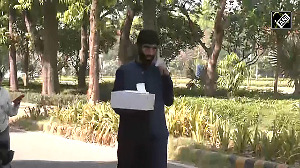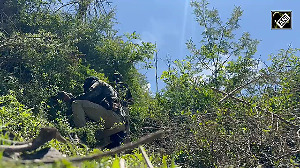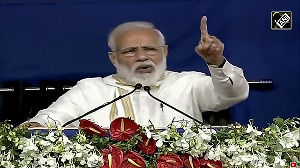The London accountant who accompanied Dr Abdul Qadeer Khan to Timbuktu on three occasions in 1998, 1999 and 2000 says the 'father' of the Pakistani bomb witnessed the digging of a well, toured an ancient Islamic library and enjoyed the views of the desert.
A remote outpost in the middle of the West African desert, Timbuktu usually attracts explorers associated in the popular mind with the adventures of the comic character Tin Tin.
And Pakistani dissidents told rediff.com the reason for Khan's visit to Timbuktu, part of landlocked West African state of Mali, was to prospect for uranium.
They say Khan's purchase of a hotel in the town, which he named the Hendrina Khan Hotel after his wife, was a cover to his real interest in the precious uranium needed for nuclear bombs.
But Abdul Ma'bood Siddiqui, a partner in the London accountants firm Reddy, Siddiqui and Watts, says he has no knowledge of any uranium prospecting. "What uranium is there in Timbuktu?" he asked when he was contacted on the telephone.
"We went three times. There is a village there, people are very poor there, we went to help them. We dug a well that is why we went there. There are other villages nearby you will get more information if you go there.
"There is a desert there. There is also an ancient Islamic library there. Once upon a time it was part of a big civilization," Siddiqui said.
Siddiqui is the author of a book on Timbuktu that Hurmat publications of Islamabad published in 2000.
| |||||||||||
"In February 1998 I received a call from Tahir Mian, a dear friend of mine and a very close associate of Dr Khan. He lives in Dubai and is a computer businessman. He said that Dr A Q Khan is planning a visit to Timbuktu and you are invited to join him.
"My joy knew no bounds at the prospect of spending a few days with Dr Khan. I reached Dubai on February 19, 1998 and met Dr Khan. He had with him one Mr Hank, a Dutch businessman dealing in air filtration system, solar energy, metallurgical machinery and materials; Lt Gen Dr Chauhan, former surgeon general of Pakistan Army and now director general of KRL (Khan Research Laboratories); and Brigadier Sajwal. Dr Khan told us that we would fly to Timbuktu via Casablamca in Morocco and Bamako, capital of Mali."
After stopping over in Casablanca and attending a dinner where Pakistani ambassador to Morocco Azmat Hussain was also present, the group flew to the Mali capital of Bamako and then chartered a private plane to fly them to Timbuktu.
"We had only a few hours in Timbuktu, which we spent in sight seeing. We returned to Dubair by the same route", Siddiqui writes.
One year later in February 1999 Siddiqui again agreed to accompany a Khan-led group back to Timbuktu. This time Khan was accompanied by his chief scientific adviser, Dr Fakhrul Hasan Hashmi, Brigadier Tajwar, director General of Security at KRL and other senior officials of the Pakistan Atomic Energy Commission. This time the group flew via Sudan, Nigeria, Niger and Chad.
In February 2000 Siddiqui describes how 'we were again air borne for Timbuktu', this time from Dubai to Khartoum, then to Niamey, capital of Niger, where ambassador Brigadier Nisar, hosted a dinner in honour of Khan.
"Niger has big uranium deposits," Siddiqui notes without further comment. On February 29, 2000 the group returned back to Dubai after visiting 10 African cities.
Describing Khan as 'very down to earth' and 'sharif', Siddiqui told rediff.com: "I did not know he was such a famous man. I am a literary man, whether I went there or not, the others were going in any case. I did not know the others."
Pakistan's Nuclear Bazaar







 © 2025
© 2025